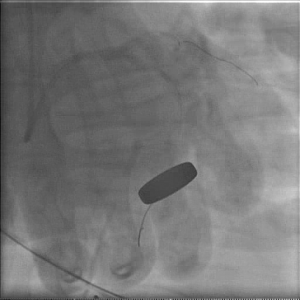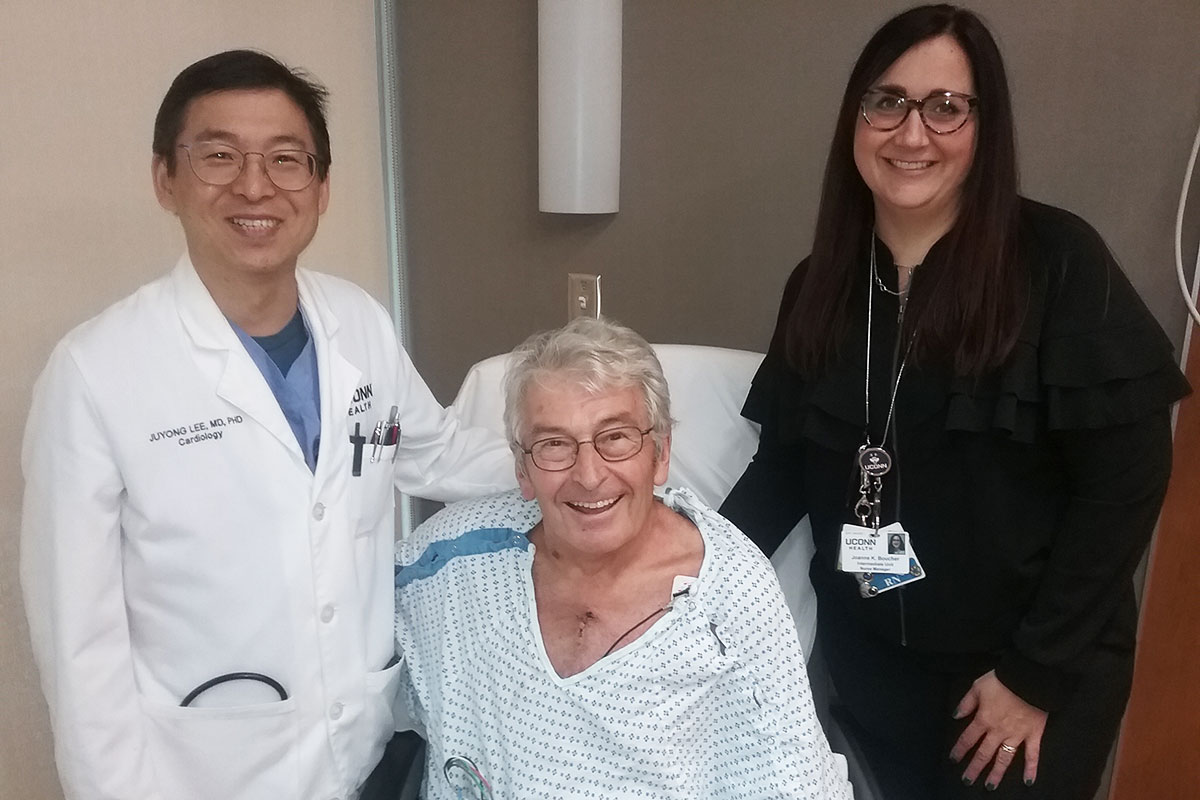A New Britain man whose heart stopped for more than 45 minutes is living proof of how fast response, teamwork, and unrelenting care can be life saving.
Several doctors and nurses who cared for him during his two and a half weeks at the UConn John Dempsey Hospital refer to John Sienicki, 74, as “the miracle man.”
Sienicki was doing yardwork the morning of Nov. 3 when he started feeling dizzy, sweating, getting nauseas, and experiencing chest pain. His wife called for help right away. The ambulance responded almost instantly.
This happened at their son’s home on Middle Road in Farmington, “basically across the street” from UConn Health, as heard in the radio transmission from the ambulance.
The proximity enabled a fast response—35 minutes from first medical contact to the insertion of the first stent to try to open up the first artery blockage. But things got complicated on the way to the cardiac catheterization lab.
The cath lab was activated and ready for his arrival because the paramedics had determined at the scene that Sienicki indeed was suffering a heart attack. They placed defibrillator pads on him right away and transported him.
Sienicki was still alert and responsive when he arrived at the hospital but then went into cardiac arrest. With the defibrillator pads already in place, the paramedics shocked his heart back into rhythm. This happened twice on the stretcher on the way to the cath lab, where Dr. JuYong Lee started the stenting procedure.
But then Sienicki’s heart stopped again, and this time it didn’t respond to the defibrillator. The staff started chest compressions, with transportation aide Brian Schramm and UConn Health firefighters Neil Prendergast, Eric Colantonio, and Brian Jooss all taking turns.

“There had to be 20 people in the room,” says Anita Sienicki, a staff nurse at UConn Health who was offsite the day her father was rushed to her hospital. Coworkers were keeping her updated by phone as she made her way there. “The entire cath lab team was phenomenal.”
The staff and paramedics were taking turns keeping his blood pumping while Lee, with CPR happening in the middle of his intervention, carefully proceeded to alleviate the blockages.
“It looked hopeless, but I didn’t want to let him go,” Lee says.
This continued for 50 minutes. Then someone mentioned that Anita Sienicki had arrived.
Within seconds, her father’s eyes opened and he started moving his hands and arms.
He was back.
“It was an amazing moment,” Lee says.
“Dr. Lee was phenomenal,” Anita Sienicki says. “And I thank the people who did the chest compressions. They were able to open up the blockage, but you worry about brain function when the heart is stopped for this long.”
Dr. Christopher Pickett, one of the cardiologists who cared for Sienicki during his hospital stay, says, “Thanks to great CPR, he has no cognitive deficits.”
“His brain is completely intact,” Anita Sienicki says. “His heart damage is very minimal. But the fact that his brain activity is good, his quality of life will be excellent. The teamwork of everybody was incredible.”
Her father says he has no recollection of the drama that day, or the subsequent procedures that followed. She says she had to explain to them that “they fixed his heart.”
The day before Thanksgiving, he left the hospital for a short-term rehabilitation facility. If all goes well he’ll be home for the holidays.
“I feel much better,” Sienicki, in a thick Polish accent, said on his discharge day. “The doctors, nurses, everybody here are very, very nice people. They work hard – very, very hard.”
Anita Sienicki, who admits to still being shaken up by the thought of her father’s improbable resuscitation, credits the efforts of the responding paramedics, the emergency department, the cath lab, the nursing staff, nurse managers Joanne Boucher and Annie Niziolek, the UConn Health Fire Department, cardiologists Pickett and Dr. Sara Tabtabai, and Lee, the interventional cardiologist who restored the flow of blood from his heart.
“I think that this patient success case symbolizes how each and every day UConn Health successfully saves lives from heart attacks whenever they strike,” Lee says.



